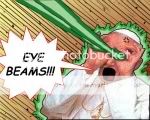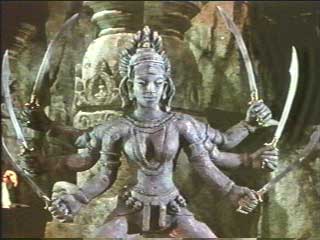Cardinal: 'Evolution Is More Than Just a Hypothesis'
I Hope the IDiots Are Listening
Vatican: Faithful Should Listen to Science
from The Associated Press
VATICAN CITY - A Vatican cardinal said Thursday the faithful should listen to what secular modern science has to offer, warning that religion risks turning into "fundamentalism" if it ignores scientific reason.
A Vatican cardinal said Thursday the faithful should listen to what secular modern science has to offer, warning that religion risks turning into "fundamentalism" if it ignores scientific reason.
Cardinal Paul Poupard, who heads the Pontifical Council for Culture, made the comments at a news conference on a Vatican project to help end the "mutual prejudice" between religion and science that has long bedeviled the Roman Catholic Church and is part of the evolution debate in the United States.
The Vatican project was inspired by Pope John Paul II's 1992 declaration that the church's 17th-century denunciation of Galileo was an error resulting from "tragic mutual incomprehension." Galileo was condemned for supporting Nicolaus Copernicus' discovery that the Earth revolved around the sun; church teaching at the time placed Earth at the center of the universe.
"The permanent lesson that the Galileo case represents pushes us to keep alive the dialogue between the various disciplines, and in particular between theology and the natural sciences, if we want to prevent similar episodes from repeating themselves in the future," Poupard said.
But he said science, too, should listen to religion.
"We know where scientific reason can end up by itself: the atomic bomb and the possibility of cloning human beings are fruit of a reason that wants to free itself from every ethical or religious link," he said.
"But we also know the dangers of a religion that severs its links with reason and becomes prey to fundamentalism," he said.
"The faithful have the obligation to listen to that which secular modern science has to offer, just as we ask that knowledge of the faith be taken in consideration as an expert voice in humanity."
Poupard and others at the news conference were asked about the religion-science debate raging in the United States over evolution and "intelligent design."
Intelligent design's supporters argue that natural selection, an element of evolutionary theory, cannot fully explain the origin of life or the emergence of highly complex life forms.
Monsignor Gianfranco Basti, director of the Vatican project STOQ, or Science, Theology and Ontological Quest, reaffirmed John Paul's 1996 statement that evolution was "more than just a hypothesis."
"A hypothesis asks whether something is true or false," he said. "(Evolution) is more than a hypothesis because there is proof."
He was asked about comments made in July by Austrian Cardinal Christoph Schoenborn, who dismissed in a New York Times article the 1996 statement by John Paul as "rather vague and unimportant" and seemed to back intelligent design.
Basti concurred that John Paul's 1996 letter "is not a very clear expression from a definition point of view," but he said evolution was assuming ever more authority as scientific proof develops.
Poupard, for his part, stressed that what was important was that "the universe wasn't made by itself, but has a creator." But he added, "It's important for the faithful to know how science views things to understand better."
from The Associated Press
VATICAN CITY -
 A Vatican cardinal said Thursday the faithful should listen to what secular modern science has to offer, warning that religion risks turning into "fundamentalism" if it ignores scientific reason.
A Vatican cardinal said Thursday the faithful should listen to what secular modern science has to offer, warning that religion risks turning into "fundamentalism" if it ignores scientific reason.Cardinal Paul Poupard, who heads the Pontifical Council for Culture, made the comments at a news conference on a Vatican project to help end the "mutual prejudice" between religion and science that has long bedeviled the Roman Catholic Church and is part of the evolution debate in the United States.
The Vatican project was inspired by Pope John Paul II's 1992 declaration that the church's 17th-century denunciation of Galileo was an error resulting from "tragic mutual incomprehension." Galileo was condemned for supporting Nicolaus Copernicus' discovery that the Earth revolved around the sun; church teaching at the time placed Earth at the center of the universe.
"The permanent lesson that the Galileo case represents pushes us to keep alive the dialogue between the various disciplines, and in particular between theology and the natural sciences, if we want to prevent similar episodes from repeating themselves in the future," Poupard said.
But he said science, too, should listen to religion.
"We know where scientific reason can end up by itself: the atomic bomb and the possibility of cloning human beings are fruit of a reason that wants to free itself from every ethical or religious link," he said.
"But we also know the dangers of a religion that severs its links with reason and becomes prey to fundamentalism," he said.
"The faithful have the obligation to listen to that which secular modern science has to offer, just as we ask that knowledge of the faith be taken in consideration as an expert voice in humanity."
Poupard and others at the news conference were asked about the religion-science debate raging in the United States over evolution and "intelligent design."
Intelligent design's supporters argue that natural selection, an element of evolutionary theory, cannot fully explain the origin of life or the emergence of highly complex life forms.
Monsignor Gianfranco Basti, director of the Vatican project STOQ, or Science, Theology and Ontological Quest, reaffirmed John Paul's 1996 statement that evolution was "more than just a hypothesis."
"A hypothesis asks whether something is true or false," he said. "(Evolution) is more than a hypothesis because there is proof."
He was asked about comments made in July by Austrian Cardinal Christoph Schoenborn, who dismissed in a New York Times article the 1996 statement by John Paul as "rather vague and unimportant" and seemed to back intelligent design.
Basti concurred that John Paul's 1996 letter "is not a very clear expression from a definition point of view," but he said evolution was assuming ever more authority as scientific proof develops.
Poupard, for his part, stressed that what was important was that "the universe wasn't made by itself, but has a creator." But he added, "It's important for the faithful to know how science views things to understand better."




























0 Comments:
Post a Comment
<< Home